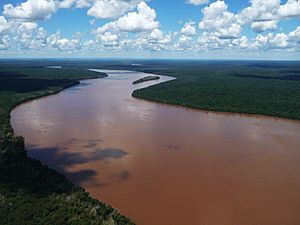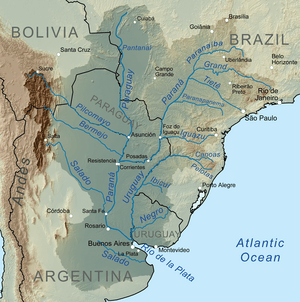Iguazu River facts for kids
Quick facts for kids Iguazú |
|
|---|---|

The river directly above Iguazu Falls
|
|

Map of the Rio de la Plata Basin, showing the Iguazu River joining the Paraná River north of the upper Uruguay River
|
|
| Other name(s) | Iguaçu, Iguazu rio, Iguassu |
| Countries | Brazil and Argentina |
| Cities |
|
| Physical characteristics | |
| Main source | Serra do Mar Near Curitiba, Paraná, Brazil 1,200 m (3,900 ft) 25°23′30″S 49°00′11″W / 25.39167°S 49.00306°W |
| River mouth | Paraná River Foz do Iguaçu, Misiones Province and Paraná, border between Argentina and Brazil 110 m (360 ft) 25°35′33″S 54°35′30″W / 25.59250°S 54.59167°W |
| Length | 1,320 km (820 mi), East-west |
| Basin features | |
| River system | Paraná River basin |
| Basin size | 62,000 km2 (24,000 sq mi) |
| Tributaries |
|
The Iguazu River (also called Rio Iguassu) is a long river in Brazil and Argentina. It is a very important branch of the Paraná River. The Iguazu River is about 1,320 kilometres (820 mi) long. Its drainage basin (the area of land that drains into the river) covers about 62,000 square kilometres (24,000 sq mi).
Where the Iguazu River Flows
The Iguazu River starts in the Serra do Mar mountains. These mountains are on the coast of the Brazilian state of Paraná. It begins close to the city of Curitiba.
For most of its journey, the Iguazu flows west through Paraná State in Brazil. This part of the river is about 1,205 kilometres (749 mi) long. After this, the Iguazu River becomes the natural border between Brazil and Argentina's Misiones Province.
Iguazu Falls: A Natural Wonder
As the river continues west, it drops off a high plateau. This creates the amazing Iguazu Falls. You can visit these falls using the Rainforest Ecological Train. The falls are protected by national parks in both Brazil and Argentina. These parks are called Iguaçu National Park (in Brazil) and Iguazú National Park (in Argentina).
The Iguazu River finally flows into the Paraná River. This meeting point is special because it's where the borders of Argentina, Brazil, and Paraguay all meet. This area is known as the Triple Frontier.
River Life: Ecology of the Iguazu
The water temperature in the Iguazu River changes a lot with the seasons. This is different from many other rivers in tropical South America. For example, the water temperature can range from about 15.5 to 29 °C (60–84 °F). The average temperature is usually just under 22 °C (72 °F). The water's pH level is usually close to neutral. It ranges from 5.9 to 8.7.
Fish and Other Creatures
About 100 different kinds of fish live naturally in the Iguazu River. Scientists also know of several types of fish that have not yet been named. Most of the fish in the river are catfish, characiforms, and cichlids.
About 70% of these fish are endemic. This means they are found only in the Iguazu River. The Iguazu Falls play a big role in this. They act like a natural barrier. This barrier helps keep different fish species separate above and below the falls. This also means that large migratory fish, common in other parts of the Paraná River Basin, are not found here. One exception is the Steindachneridion melanodermatum, which is a threatened fish in the lower part of the river.
Almost 30 introduced species of fish have been found in the river. About one-third of these come from other continents. Examples include carp, largemouth bass, tilapia, and African sharptooth catfish. The rest come from other parts of South America. These include dorado, Cichla kelberi, pacu, Brycon hilarii, Prochilodus lineatus, and Odontesthes bonariensis.
The unique Aegla crustaceans are also common in the Iguazu River Basin.
Environmental Concerns
In July 2000, a large amount of crude oil accidentally spilled into the river. This happened from an oil refinery near the city of Curitiba.
Images for kids
See also
 In Spanish: Río Iguazú para niños
In Spanish: Río Iguazú para niños
 | John T. Biggers |
 | Thomas Blackshear |
 | Mark Bradford |
 | Beverly Buchanan |


